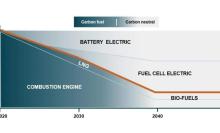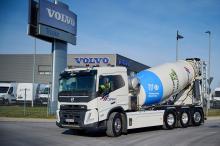
With its commitment to Science Based Targets, Volvo CE is continuing its long-time focus on environmental care and driving industry transformation to combat climate change.
The net-zero value chain greenhouse gas emissions target by 2040 is a united commitment for Volvo Group across all business areas. It is set for ten years earlier than the SBTi commitment. This is because Volvo products have an average lifetime of 10 years in the customer use phase, so for the entire rolling fleet to have net-zero emissions by 2050, all products delivered after 2040 have net-zero emissions.
Volvo CE has also set its own high interim goals to be met by 2030. These include cutting emissions in half in its operations, facilities and manufacturing processes and achieving 30% in absolute reductions in the use of its products, whose indirect emissions account for the highest proportion of the company’s carbon emissions. For the construction equipment industry, the majority of emissions are those referred to as indirect emissions. In other words, the emissions created when the machines are being used as soon as they leave the factories.
Volvo CE president Melker Jernberg says: “Climate change is real and one of the greatest challenges of our time. As a world-leading manufacturer, we not only have a responsibility to reduce our carbon footprint, we also have the clear vision, determination and talents to drive this transformation that is so urgently needed now. The choices we make today will form the world tomorrow – and we choose to act.”
Volvo CE is already committed to decarbonisation through its industry-leading technology development and engagement in climate change initiatives, such as the Construction Climate Challenge (CCC) and the WWF Climate Savers Program. With SBTi, it has another tool to ensure the reductions are aligned with the latest climate science to reach the Paris Agreement.
The company is taking a holistic approach to tackling climate change. It will follow its tried-and-tested innovation pathway of embracing the three streams of electromobility: battery-electric machines, hydrogen fuel-cell powered equipment and improved internal combustion engine solutions. It will also continue its work with industry-leading partnerships to accelerate the development of new technologies, work together with customers to bring sustainable solutions to market, and collaborate with dealers and suppliers to explore new ways of working.
“New exciting technology is definitely one of the key ways to reduce carbon impact,” says Niklas Nillroth, head of Sustainability and Public Affairs at Volvo CE. “However, another significant driver in achieving these targets will be a new level of collaboration, internally as well as externally through partnerships. Only with joint efforts, where each and every one of us take responsibility for our part with a holistic mindset, will we be able to collectively reach these important goals. Together we help build the world we want to live in.”
SBTi is a collaboration between CDP, United Nations Global Compact, World Resources Institute and World Wide Fund for Nature (WWF). It helps companies establish science-based targets to reduce greenhouse gas emissions and transform business operations to fit the future low-carbon economy.










